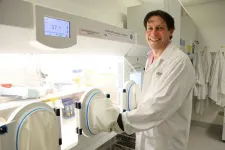(Press-News.org) New findings from researchers at UCLA Health suggest that measuring changes in how pupils react to light could help predict recovery from depression and personalize transcranial magnetic stimulation (TMS) treatment of major depressive disorder.
TMS is a safe, non-invasive therapy that uses magnetic fields to stimulate parts of the brain involved in mood regulation. While TMS is proven effective, not all patients respond equally well to the therapy. The ability to predict who will benefit most could allow doctors to better customize and target treatments.
In two recent studies, UCLA scientists found that the pupil’s response to light before treatment correlated with improvements in depression symptoms over the course of therapy. Pupil size reflects activation of the autonomic nervous system, which controls involuntary functions and is negatively impacted in people with depression.
The first study, appearing in the Journal of Affective Disorders, reports on outcomes for 51 patients who underwent daily TMS sessions. Before receiving treatment, researchers measured the patients' baseline pupillary constriction amplitude, or CA: how much the pupil shrinks when exposed to light. The pupil’s constriction is an indicator of parasympathetic nervous system function. The researchers found a significant association between baseline pupil constriction amplitude and symptom improvement, indicating that a greater constriction amplitude at baseline was associated with a better outcome. In other words, those with larger pupil constriction in response to light at baseline showed greater symptom improvement over their full treatment.
The second study, appearing in Brain Stimulation, went further and compared patients who were treated for depression with one of two common TMS protocols: 10 Hz stimulation and intermittent theta burst stimulation (iTBS). In 10 Hz stimulation, magnetic pulses are delivered at a fixed rate of 10 pulses per second, or 10 Hz, a continuous and relatively high-frequency stimulation. iTBS is a faster form of stimulation with bursts of three pulses at 50 Hz, repeated with short breaks between bursts. This pattern is thought to mimic the natural rhythm of certain brain activities.
The researchers found that people with slower pupillary constriction had significantly greater improvement in depression after 10 sessions if they received iTBS rather than 10 Hz treatment.
"These results suggest we may be able to use a simple test of the pupil to identify who is most likely to respond to electromagnetic stimulation of the brain to treat their depression," said researcher Cole Citrenbaum, lead author of both studies and a researcher with the TMS Clinical and Research Program at the Semel Institute for Neuroscience and Human Behavior at UCLA.
The researchers propose that measuring pupillary reactivity before starting TMS could eventually help guide treatment selection on an individual basis. “Additionally, we may be able to tailor the frequency of stimulation to the individual patient to maximize their benefit from treatment,” Citrenbaum said. This personalized approach could lead to better outcomes for patients.
"At the present time, about 65% of patients treated with TMS have a substantial improvement in their depression,” said Dr. Andrew F. Leuchter, senior author of both studies and Distinguished Professor of Psychiatry at the Jane and Jerry Semel Institute for Neuroscience and Human Behavior at UCLA. "Our goal is to have more than 85% of patients fully recover from depression. As we better understand the complex brain activity underlying depression, we move closer to matching patients with the treatments that ensure their full recovery. Pupil testing may be one useful tool in reaching this goal."
The studies add to growing evidence on the benefits of biologically-based personalization in treating major depression. UCLA researchers plan further trials to confirm the value of pupillometry in optimizing transcranial magnetic stimulation.
Articles:
Pretreatment pupillary reactivity is associated with outcome of Repetitive Transcranial Magnetic Stimulation (rTMS) treatment of Major Depressive Disorder (MDD) Citrenbaum et al. Journal of Affective Disorders, Volume 339, 2023, Pages 412-417, ISSN 0165-0327, https://doi.org/10.1016/j.jad.2023.07.008.
Pretreatment pupillary reactivity is associated with differential early response to 10 Hz and intermittent theta-burst Repetitive Transcranial Magnetic Stimulation (rTMS) treatment of Major Depressive Disorder (MDD). Citrenbaum et al. Brain Stimulation, 2023, ISSN 1935-861X, https://doi.org/10.1016/j.brs.2023.10.006.
END
Pupil response may shed light on who responds best to transcranial magnetic stimulation for depression
Two new studies from UCLA Health suggest that the “window to the soul” may give a glimpse into the brain in depression
2023-10-20
ELSE PRESS RELEASES FROM THIS DATE:
Women with a heart healthy diet in midlife are less likely to report cognitive decline later
2023-10-20
Women with diets during middle age designed to lower blood pressure were about 17 percent less likely to report memory loss and other signs of cognitive decline decades later, a new study finds.
Led by researchers from NYU Grossman School of Medicine, the new findings suggest that a mid-life lifestyle modification – adoption of the Dietary Approaches to Stop Hypertension, or DASH diet – may improve cognitive function later in life for women, who make up more than two-thirds of those diagnosed with Alzheimer’s disease, the most prevalent form of dementia.
The findings, published online today in ...
Recognizing excellence in endocrinology, ESE announces the winners of its prestigious Awards for 2024
2023-10-20
The winners of the Society’s prestigious annual Awards for 2024 have all contributed to improving knowledge and expertise in endocrinology and have helped drive innovation and progression across the field.
Each of these deserving winners will be presenting a plenary lecture at ESE’s annual Congress, the European Congress of Endocrinology (ECE) 2024, which will be held in Stockholm, Sweden from 11-14 May 2024.
The 2024 Geoffrey Harris Award is being presented to Jens C. Brüning (Germany). This Award recognises outstanding researchers in the field of neuroendocrinology. Jens Brüning is the Director of the Max Planck Institute for Metabolism Research ...
Deep dive into the gut unlocks new disease treatments
2023-10-20
The more diverse species in your gut, the better it is for your health. Now an international team led by the Hudson Institute of Medical Research has found a way to determine which species are important and how they interact to create a healthy microbiome.
Understanding these relationships opens the door to a new world of medical opportunities for conditions from Inflammatory Bowel Disease to infections, autoimmune diseases and cancers.
Associate Professor Samuel Forster and his team at Hudson Institute of Medical Research, working with collaborators from the Institute for Systems Biology in ...
Felix Beuschlein announced as winner of 2024 Transatlantic Alliance Award in Endocrinology
2023-10-20
Felix Beuschlein is Professor of Internal Medicine/Endocrinology and Director of the Clinic for Endocrinology, Diabetology and Clinical Nutrition at the University Clinic Zurich in Switzerland. He received his medical degree from School of Medicine at the University of Würzburg and completed his medical training in Freiburg, both in Germany. For postdoctoral studies he joined the University of Michigan in Ann Arbor. Following a professorship for Endocrine Research at the University of Munich, he was elected for a chair position at the University of Zurich in 2017.
The Transatlantic ...
Partnership looks to the stars to improve cybersecurity
2023-10-20
A new partnership between Edith Cowan University (ECU), observation data company QL Space, and University of South Wales (UK) is looking to the stars, literally, to create more secure and efficient communication.
The collaboration will focus on ‘free space optics’, which uses light all around we can’t see to communicate, by sending data via light particles, or photons.
ECU School of Science Senior Lecturer Dr Shihao Yan said this brought with it many benefits compared to using radio frequencies to send information.
“When ...
Electric hair styling products common cause of burn injuries in children
2023-10-20
AAP media contacts: Lisa Black, 630-626-6084, lblack@aap.org
Tom McPheron, 630-626-6315, tmcpheron@aap.org
...
Adolescents and young adults of all identities open to discussing sexual identity and gender identity with doctors
2023-10-20
AAP media contacts:
Lisa Black, 630-626-6084, lblack@aap.org
Tom McPheron, 630-626-6315, tmcpheron@aap.org
Adam Alexander, 630-626-6765, aalexander@aap.org
Washington, D.C.— Teenagers and young adults are fairly open to the idea of talking with their doctors and nurses about their sexual orientation and gender identity and are okay being asked through various methods, whether on paper, electronically, or in person, according to research presented during the 2023 AAP National Conference ...
Live streaming platform ‘Twitch’ poses risks for minors who may be manipulated, preyed upon: New research
2023-10-20
AAP media contacts:
Lisa Black, 630-626-6084, lblack@aap.org
Tom McPheron, 630-626-6315, tmcpheron@aap.org
Adam Alexander, 630-626-6765, aalexander@aap.org
Washington, D.C.— A popular live streaming platform, Twitch, poses risks to minors who can interact with adult strangers and donate money to streamers without the supervision of a parent or guardian, according to research presented during the 2023 AAP National Conference & Exhibition at the Walter E. Washington Convention Center.
The abstract, “Predator Paradise: Analyzing the Ease ...
Father’s postpartum depression doubles child’s odds of adverse childhood experiences before age 5
2023-10-20
AAP media contacts: Lisa Black, 630-626-6084, lblack@aap.org
Tom McPheron, 630-626-6315, tmcpheron@aap.org
Adam Alexander, 630-626-6765, aalexander@aap.org
Washington, D.C.—A father’s depression during his child’s first year of life has been associated with difficulties in parenting and child behavior, but new research finds that it also doubles the odds of a child having three or more adverse childhood experiences ...
Delta-8 and its online availability to minors raises concerns
2023-10-20
For release: 12:01 a.m. ET Friday, Oct. 20, 2023
AAP media contacts: Lisa Black, 630-626-6084, lblack@aap.org
Tom McPheron, 630-626-6315, tmcpheron@aap.org
Adam Alexander, 630-626-6765, aalexander@aap.org
WASHINGTON, D.C.-- Delta-8 is a substance that produces a high akin to THC. While THC is a federally banned substance, delta-8 is technically a different chemical and is therefore not federally banned. New research suggests the growing popularity of ...
LAST 30 PRESS RELEASES:
The Lancet: First-ever in-utero stem cell therapy for fetal spina bifida repair is safe, study finds
Nanoplastics can interact with Salmonella to affect food safety, study shows
Eric Moore, M.D., elected to Mayo Clinic Board of Trustees
NYU named “research powerhouse” in new analysis
New polymer materials may offer breakthrough solution for hard-to-remove PFAS in water
Biochar can either curb or boost greenhouse gas emissions depending on soil conditions, new study finds
Nanobiochar emerges as a next generation solution for cleaner water, healthier soils, and resilient ecosystems
Study finds more parents saying ‘No’ to vitamin K, putting babies’ brains at risk
Scientists develop new gut health measure that tracks disease
Rice gene discovery could cut fertiliser use while protecting yields
Jumping ‘DNA parasites’ linked to early stages of tumour formation
Ultra-sensitive CAR T cells provide potential strategy to treat solid tumors
Early Neanderthal-Human interbreeding was strongly sex biased
North American bird declines are widespread and accelerating in agricultural hotspots
Researchers recommend strategies for improved genetic privacy legislation
How birds achieve sweet success
More sensitive cell therapy may be a HIT against solid cancers
Scientists map how aging reshapes cells across the entire mammalian body
Hotspots of accelerated bird decline linked to agricultural activity
How ancient attraction shaped the human genome
NJIT faculty named Senior Members of the National Academy of Inventors
App aids substance use recovery in vulnerable populations
College students nationwide received lifesaving education on sudden cardiac death
Oak Ridge National Laboratory launches the Next-Generation Data Centers Institute
Improved short-term sea level change predictions with better AI training
UAlbany researchers develop new laser technique to test mRNA-based therapeutics
New water-treatment system removes nitrogen, phosphorus from farm tile drainage
Major Canadian study finds strong link between cannabis, anxiety and depression
New discovery of younger Ediacaran biota
Lymphovenous bypass: Potential surgical treatment for Alzheimer's disease?
[Press-News.org] Pupil response may shed light on who responds best to transcranial magnetic stimulation for depressionTwo new studies from UCLA Health suggest that the “window to the soul” may give a glimpse into the brain in depression

